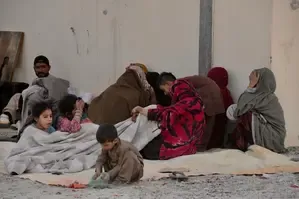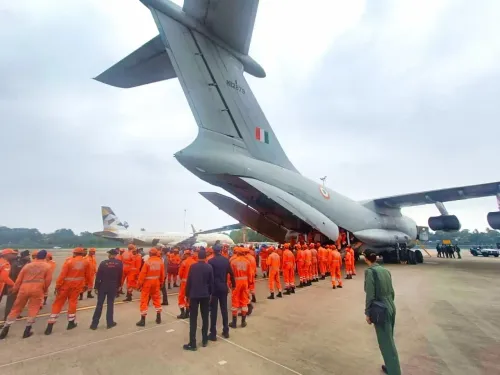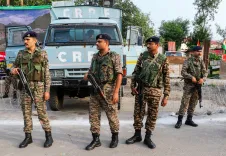Thousands of Afghan Refugees Risk Forced Deportation from Pakistan and Iran

Synopsis
Key Takeaways
- 674 Afghan families deported from Iran and Pakistan.
- Dire conditions for undocumented migrants in Iran.
- Increased police raids in Pakistan.
- Legal Afghan migrants face harassment and risk deportation.
- Advocacy groups call for an end to forced deportations.
Kabul, March 16 (NationPress) As the forcible deportation and illegal detention of Afghan refugees persists, recent statistics indicate that Iran and Pakistan have deported 674 Afghan migrant families from March 8 to March 14.
Iran expelled 564 families via various border crossings, while Pakistan forcibly sent back 110 families. The data shows that 110 families re-entered Afghanistan through the Spin Boldak crossing, 150 via Pul-e-Abrisham in Nimroz, and 414 through Islam Qala in Herat, as reported by Afghan's Amu TV on Saturday, referring to data compiled from Afghan Taliban statements.
This week, Nader Yarahmadi, the Director General of the Bureau for Foreign Nationals and Immigrants Affairs at Iran’s Ministry of Interior, stated that starting March 21, 2025, undocumented Afghan migrants in Iran will lose access to healthcare, education, and other vital services.
“The circumstances for migrants in Iran are alarming. Anti-migrant sentiment has surged, with police apprehending individuals for various reasons, including those with legal visas and valid documentation, leading to their deportation,” reported TOLO news, quoting Marofeh Eshaqi, an Afghan migrant in Iran.
The plight of Afghan migrants in Pakistan is similarly grim. “Pakistani police have recently been executing harsh raids, even in the dead of night, invading homes and detaining Afghan refugees,” TOLO news reported.
Many affected individuals are located in Islamabad and Rawalpindi, where authorities have intensified pressure on Afghan nationals to depart. As Pakistan amplifies efforts to expel Afghan migrants, numerous individuals are compelled to auction their household items at significantly reduced prices.
“I leased this shop a year ago for a considerable sum of approximately 1.8 million Pakistani rupees and made substantial investments. However, due to the government's directive, I am forced to relocate to another city.
If I do not leave, they will apprehend and deport us back to Afghanistan. I have listed all my shop's inventory for auction at minimal prices,” shared Shujauddin, an Afghan migrant residing in Rawalpindi with his six-member family, who faces deportation despite possessing a valid visa.
“We are all anxious about our future. Even those with visas, Proof of Registration (POR) cards, or Afghan Citizen Cards (ACC) are encountering difficulties in Pakistan,” remarked Reza Sakhi, another Afghan migrant.
Last week, the Joint Action Committee (JAC) for Refugees in Pakistan, an advocacy organization based in Karachi and Islamabad focused on the rights of Afghan refugees, issued a press release demanding an end to arrests, unlawful detentions, and harassment of Afghan refugees in Islamabad and Rawalpindi.
Earlier this month, a coalition comprising human rights organizations and refugee advocacy groups submitted an open letter to the Pakistani government urging an immediate cessation of the forced deportation of Afghan migrants, as reported by local media.
Afghan refugees are enduring relentless harassment in both Pakistan and Iran. They have appealed to the Afghan Government and Human Rights organizations to advocate on their behalf.
The refugees expressed that despite holding valid legal documentation, they are threatened by unlawful detention, deportation, and discrimination.
Several Afghan refugees have also accused authorities in Iran and Pakistan of maltreatment, including beatings and humiliation.
--int/scor/rs










